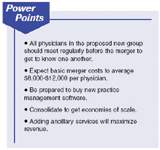Article
Practice mergers: What makes a winner
When small groups merge, doctors can earn more—if they have a good business plan and execute it well.

A 6-year-old merger of seven solo primary care physicians in central Georgia has not fared quite as well. Although the practice has grown into a multispecialty group of 27 physicians, the original partners and other doctors who've bought into Cornerstone Medical Associates in Warner Robins, GA, are still paying off loans related to the merger. So even though per-doctor revenues are up, the partners have seen no increase in income, says pediatrician David N. Harvey III.
What divides the winners from the losers in the merger sweepstakes? Consultants offer a long list of factors, starting with the motivations of the merging physicians and their willingness to operate as a group, rather than as a collection of separate practices.
Here are some financial factors to consider when you set upon the task of contemplating whether a practice merger makes sense, along with practical advice on how to maximize your return.
Take hidden costs into consideration
Let's say you're in a group of three physicians, and you've decided to merge with a two-doctor practice down the road. How much will it set you back, and what are the hidden costs?
Gary Matthews, a practice management consultant in Atlanta, figures it will cost $8,000 to $12,000 per physician for legal, accounting, and consulting fees. So the total bill for five doctors might be as high as $60,000. But that estimate doesn't include the costs of replacing computer systems, marketing, setting up a central office, or relocating practices to a central site. A new practice management system alone would cost a medium-sized group $75,000 to $100,000, says Matthews.
Even if you're going to stay in separate offices, it's important to have a single billing and scheduling system. Horizon Medical, a 25-doctor primary care practice in Grand Haven, MI, found this out the hard way. Because individual sites still gather their own billing data, feeding it into a central office that sends out the bills, the efficiency of collections varies a great deal. "In our hybrid system, one office has great A/R and another has terrible A/R," says FP David T. Ottenbaker, the group's leader. After 10 years together, he adds, Horizon's physicians are finally ready to centralize billing and collections.
If the merging practices decide to combine some or all of their offices in a central location, the relocation costs will vary, depending on local real estate and construction prices, the specialties involved, the number of offices being consolidated, and other factors. Marketing costs will also vary from one group to another. Variables include whether the operation is centralized or decentralized, the cost of local media, and the dominance of the group in its service area.
Prepare to make less money at first





